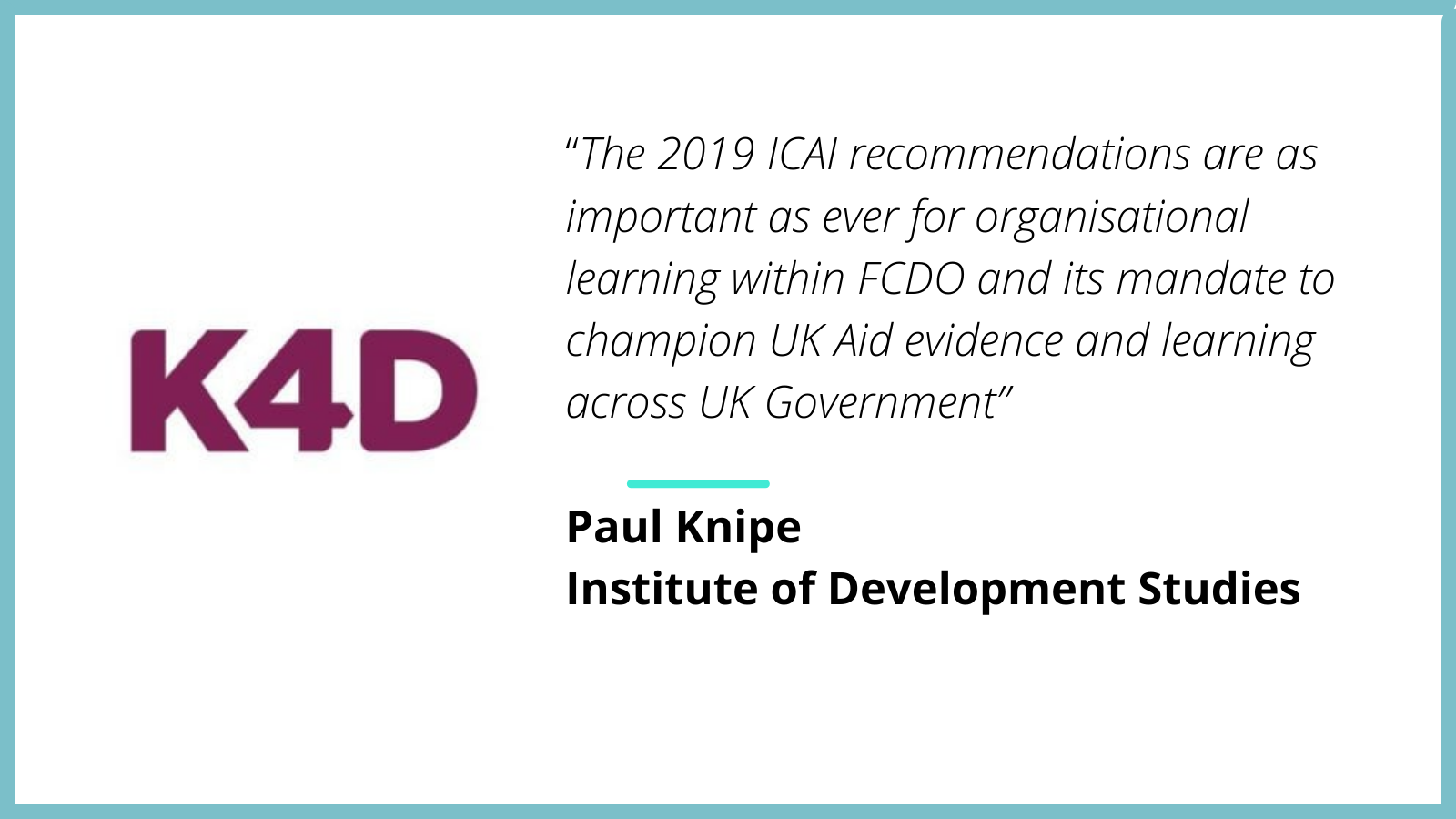Evidence and learning for development impact - what works? K4D: a model for effective evidence and learning
Posted 2021-09-22 09:28:08 by Joanna Howard, Paul Knipe, Neringa Collier and Kerry Millington

The UK Aid sector has faced unprecedented challenges over the last 18 months due to the global Covid-19 pandemic, reduction in funding, and shake up of the politics and policy driving development. Constant throughout all the debates and changes has been the importance of quality evidence and learning to enhance development impact. But how can this take place in an organisation such as the UK Foreign, Commonwealth and Development Office (FCDO)? Put simply, what works?
How can an organisation like the UK Foreign, Commonwealth and Development Office (FCDO) successfully use evidence and learning to increase development impact? Put simple, what work? Here we draw on the experience of the Knowledge, Evidence and Learning for Development programme (K4D) .
The Independent Commission for Aid Impact (ICAI) published a review in 2014 of how DFID learns . The review identified a deficit in DFID’s organisational learning processes and capacities, finding that while individuals are supported to learn, and there were many isolated examples of good learning practice, these were not consistently integrated. Also, that this learning was not enabled during implementation. They recommended that DFID invest in continuous learning from evidence and from staff knowhow on what works and what does not, for impacts on the ground.
K4D builds on a previous helpdesk – the Governance Resource Centre – set up in 2001 to ensure that DFID’s governance cadre had rapid access to the best available evidence for improved decision-making. The helpdesk’s mission was to support DFID policy and practice by providing policymakers and practitioners with easy access to the most recent research and thinking in governance for development. It was believed that better knowledge should lead to better governance, which should in turn underpin other reforms and contribute to poverty reduction. DFID staff were involved in the design of the helpdesk, wanting to ensure that evidence played a significant role in better decision-making.
Independent and unbiased
The helpdesk was designed to be independent and unbiased, a unique source where government advisors were not able to shape the outcomes by asking questions in a certain way, or by asking to exclude or include particular sources of evidence. The research fellows who manned the helpdesk – usually PhDs and with their own specific areas of expertise – were (and still are) hired because of their skills in identifying and synthesising evidence. They are specifically forbidden from providing their own commentary or opinion. They pull together the best evidence they can find, including any debates/critiques if necessary, so that these are visible, and leave it at that. They can only comment on the strength or weakness of the underlying evidence, so that advisors can make more informed judgments. The vast majority of helpdesk reports are freely available online to provide a public good to help others improve their use of evidence.
K4D’s core contributions
Since 2016, K4D has built on this legacy, and provides three core contributions to DFID/FCDO which respond to the issues raised by ICAI:
- Timely, independent and unbiased evidence, synthesised by professional researchers without opinion or recommendations, for FCDO staff to make their own informed judgements.
- Facilitated learning spaces in which this evidence can be brought into dialogue with the knowledge and experience of FCDO staff, to draw out learning about the useful application of these sources of knowledge, in the context of specific programmes and policies.
- Accessible knowledge products which enable wider uptake of knowledge, evidence and learning across government and in the general public.
A model for future learning on good development practice
A further ICAI review of how UK Aid learns in 2019 reviewed how overseas development assistance is spent by government departments other than DFID. This report highlighted the positive impact of coordination across departments in-country but identified a lack of integration of learning throughout the programming cycle which, together with the common practice of outsourcing of monitoring and evaluation, contributed to a lack of learning amongst staff about what works and what does not. They recommended that DFID should support and invest in learning systems and processes and a cross-departmental knowledge management platform for shared learning on good development practice.
Since this report, DFID and the Foreign and Commonwealth Office have merged and the need for organisational learning, and the opportunities and challenges for enabling learning have increased.
“The 2019 ICAI recommendations are as important as ever for organisational learning within FCDO and its mandate to champion UK Aid evidence and learning across UK Government.” - Paul Knipe
The K4D experience of what works, to bring about and enhance evidence use and learning, is a model that FCDO can build upon in the coming years.
This blog post was originally posted as an Opinion piece on the Institute of Development Studies website on 2 July 2021.
Authors: Joanna Howard, Institute of Development Studies, Paul Knipe, Institute of Development Studies, Neringa Collier, University of Birmingham and Kerry Millington, Liverpool School of Tropical Medicine.
K4D services are provided by a consortium of leading organisations working in international development, led by the Institute of Development Studies (IDS), with the Education Development Trust, Itad, University of Leeds Nuffield Centre for International Health and Development, Liverpool School of Tropical Medicine (LSTM), University of Birmingham International Development Department (IDD) and the University of Manchester Humanitarian and Conflict Response Institute (HCRI). K4D has been working for five years with the UK Department for International Development (DFID), the FCDO and other UK aid spending departments to support evidence use and enable learning amongst staff and across government for improved development outcomes. [It is a knowledge service which provides rapid evidence syntheses via its helpdesk function, facilitated interactive learning processes (‘learning journeys’), and knowledge products for broader uptake. https://www.ids.ac.uk/download.php?file=wp-content/uploads/2018/10/K4D-infographic.pdf ]










































































































